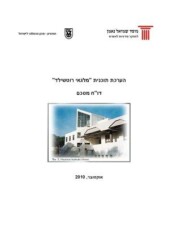The Rothschild post-doctoral fellowships were established in 1979 with the aim of enabling Israeli PhDs to spend a post-doctoral period of study abroad. The program is considered to be one of the most prestigious fellowships available for Israeli scholars.
The main goal of the research was to evaluate the impact of the program on the candidates’ careers and to assess their chances of pursuing academic careers in leading universities and research institutions in Israel. The research population included 359 candidates who applied to the program between 1996 and 2005. Three groups are included in the analysis: candidates who received the fellowship (Rothschild fellows), candidates who their application was turned down by the evaluation committee and candidates who chose to decline the fellowship.
The research methodologies included an evaluation survey and a bibliometric output analysis, based on the publication analysis of 269 researchers. The bibliometric examination showed that the quantity and quality of academic citations of all three groups were significantly higher than the Israeli and the global average in most academic fields. The evaluation survey encompassed 216 Rothschild candidates. The findings of the survey showed that Rothschild fellows achieved greater success in attaining tenured track positions (in Israel and abroad) than candidates who their application was turned down by the evaluation committee.


